6 Best BookStack Alternatives in 2026 (Self-Hosted and Hosted)
Looking for an alternative to BookStack? You've come to the right place.
The development of BookStack started back in 2015. Since then, it has undergone several updates and improvements, thanks to contributions from the open-source community. BookStack has gained popularity among developers, teams, and organizations looking for a simple and efficient way to manage their documentation.
Most teams looking for a BookStack alternative fall into two camps: those who want a modern, hosted tool with better collaboration, and those who want another self-hosted, open-source solution with fewer limitations. This guide covers both.
What is BookStack?
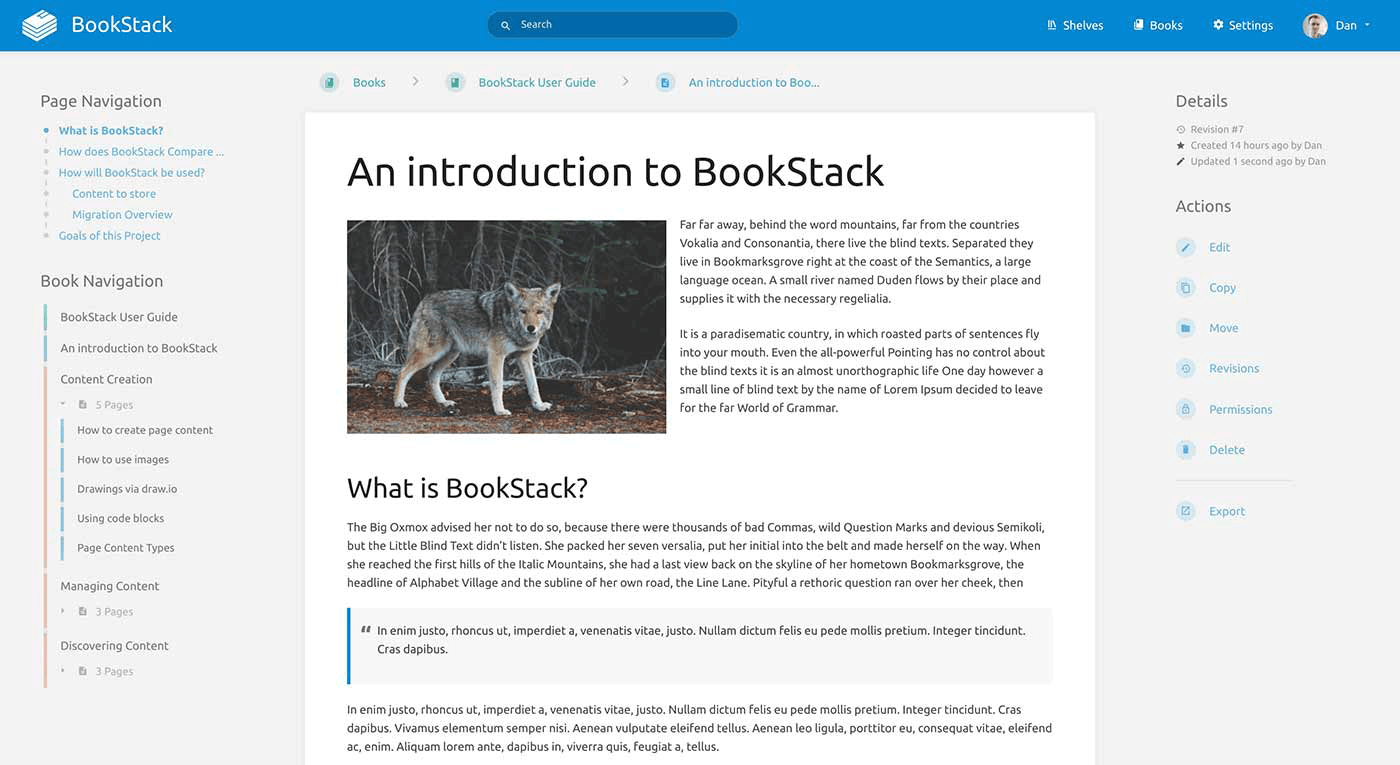
BookStack is a free open-source documentation platform. It's open-source, built on PHP, and uses the Laravel framework.
BookStack offers a hierarchical structure for organizing content, allowing you to create books, chapters, and pages to structure your documentation logically. It covers most of the essentials but lacks some advanced features, such as document translation, advanced search and filtering options, and real-time collaboration with live editing, which are found in some other popular documentation tools.
The development and maintenance of BookStack continue to be community-driven, with contributors helping enhance its features and address any issues.
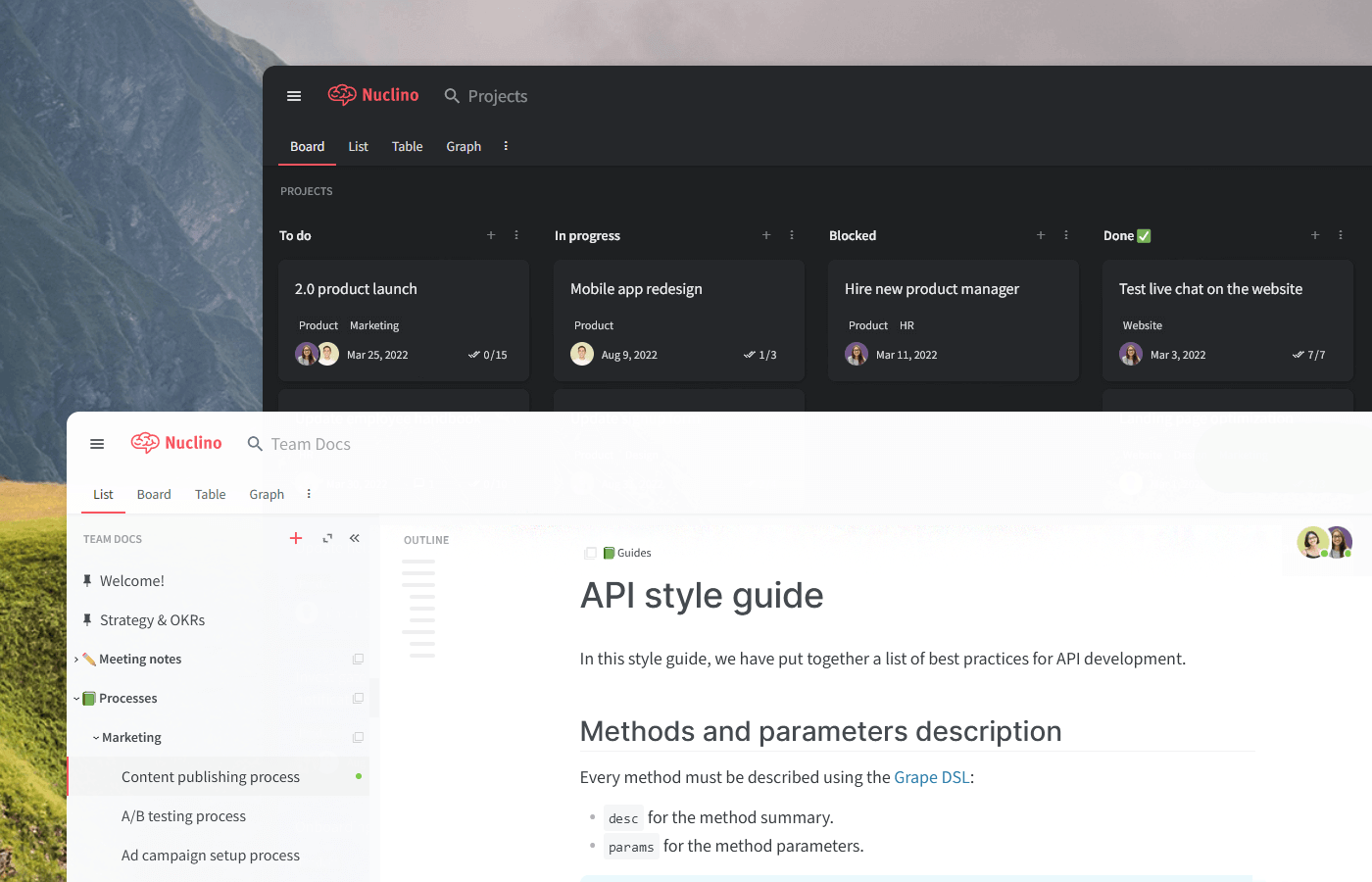
Why you may need a BookStack alternative
BookStack is not without its drawbacks, and there are many reasons why you may be searching for a BookStack alternative:
The installation process involves many steps and may be challenging for people not familiar with setting up Laravel applications (source)
BookStack doesn't offer a lot of flexibility when it comes to organizing content hierarchically, limiting you to creating Books, Chapters, and Pages, with no additional levels of nesting (source)
The visual customization options offered by BookStack are quite limited (source)
Does that sound familiar? Then it might be time to switch — fortunately, there are many great BookStack alternatives to choose from.
6 Best BookStack alternatives
To make your decision easier, we've put together a list of the best BookStack alternatives and competitors, based on real reviews.
Check out the list below and find the solution that best suits your needs.
1. Nuclino
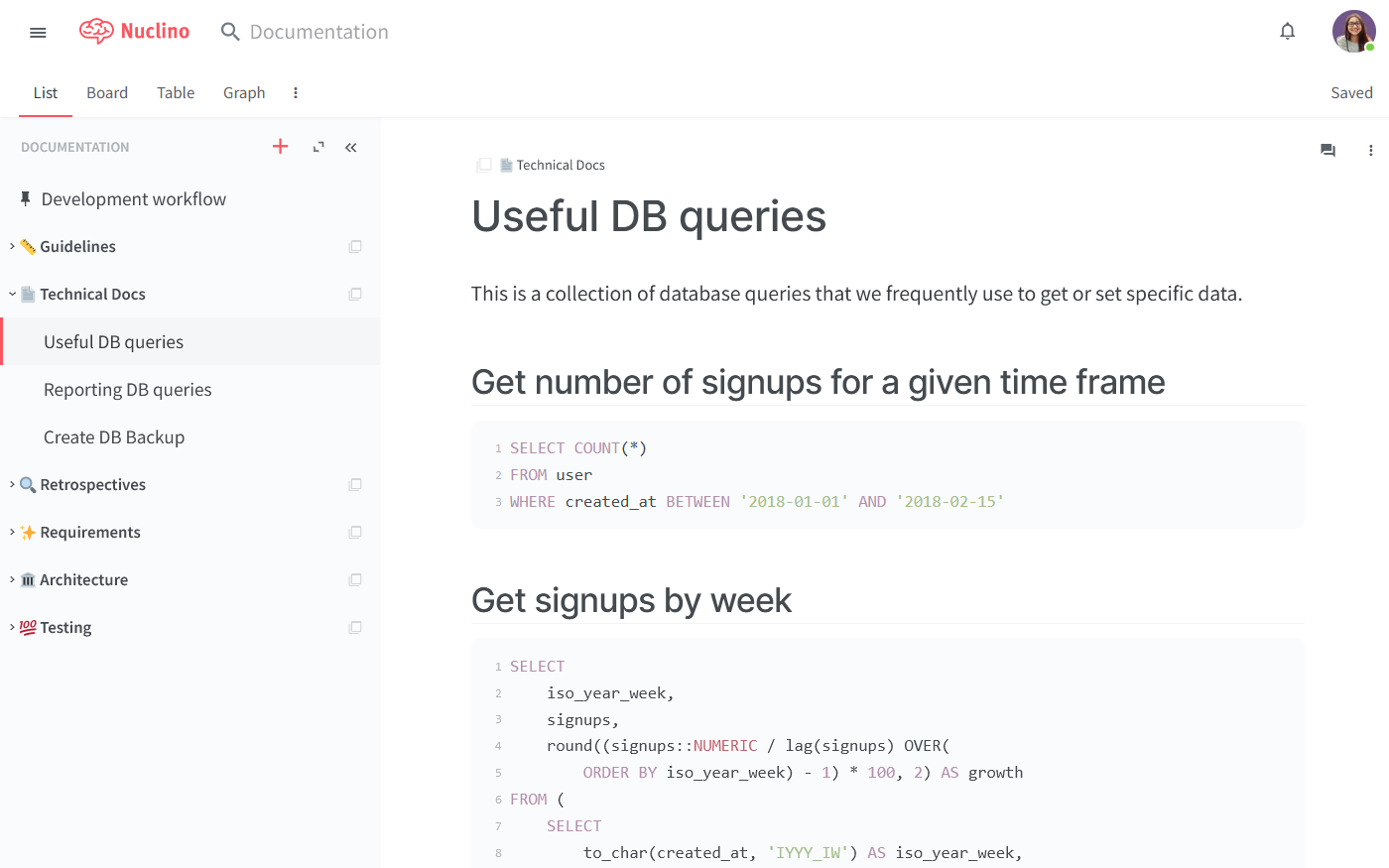
Pricing: Free, advanced features starting from $6/user/month
Rating on Capterra: 4.7/5
If you're considering an alternative to BookStack for your public or internal documentation needs, Nuclino can be a great option. It's a modern, lightweight, and fast knowledge base and wiki software.
While BookStack doesn't offer any dedicated collaboration features, all content in Nuclino can be collaboratively edited by multiple team members in real time without version conflicts. Every edit is automatically recorded in the version history, and you can effortlessly restore previous versions if necessary. In case you are looking to build a more static knowledge base, you can also assign the read-only or comment-only roles to your users, preventing unwanted or accidental edits.
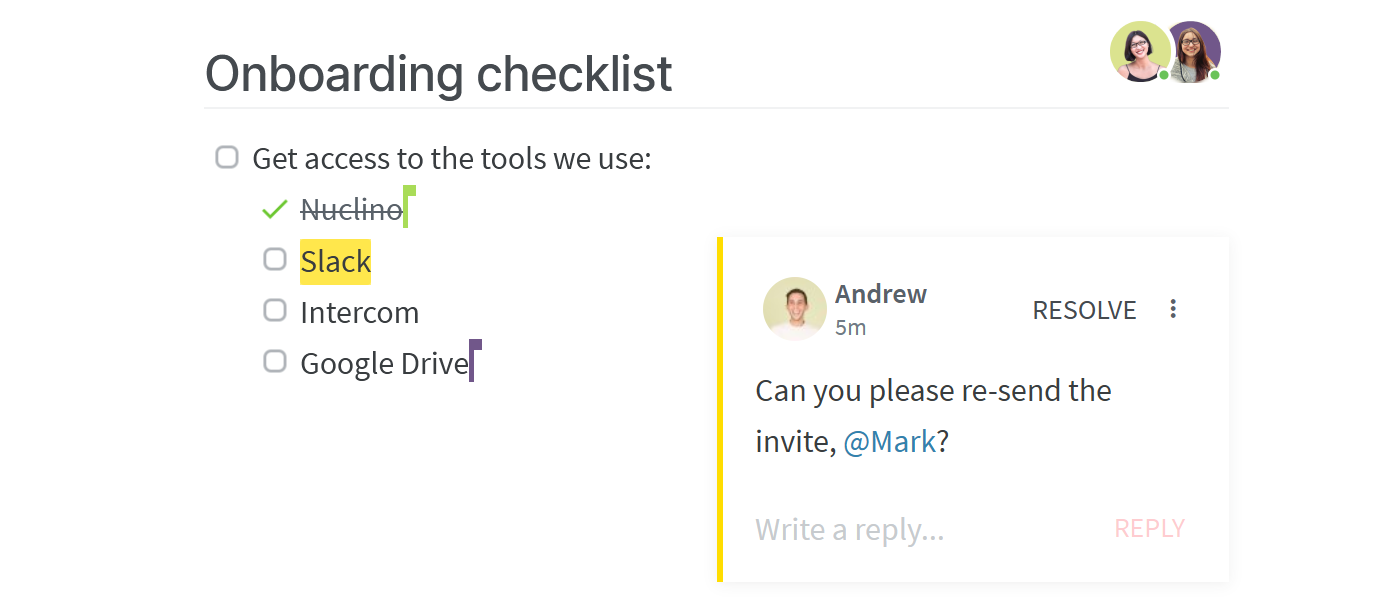
Performance is another notable strength of Nuclino. Every interaction, from search to editing, is optimized for speed — no loading spinners or unnecessary waiting. Markdown commands and hotkeys enable quick content formatting without interrupting workflow. The search is just as fast, allowing you to quickly retrieve the information you need.
You can also turn any Nuclino workspace into a public website, accessible to anyone on the web and discoverable via search engines. It's perfect for help centers, user documentation, changelogs, and much more.

And while Nuclino can be used exclusively as a documentation platform, it's a highly versatile tool that is capable of much more. It's a unified workspace that works like a collective brain, allowing you to bring all your knowledge, docs, and projects together in one place. It works out of the box, with virtually no learning curve, allowing not only developers, but also non-technical users to quickly get the hang of it.
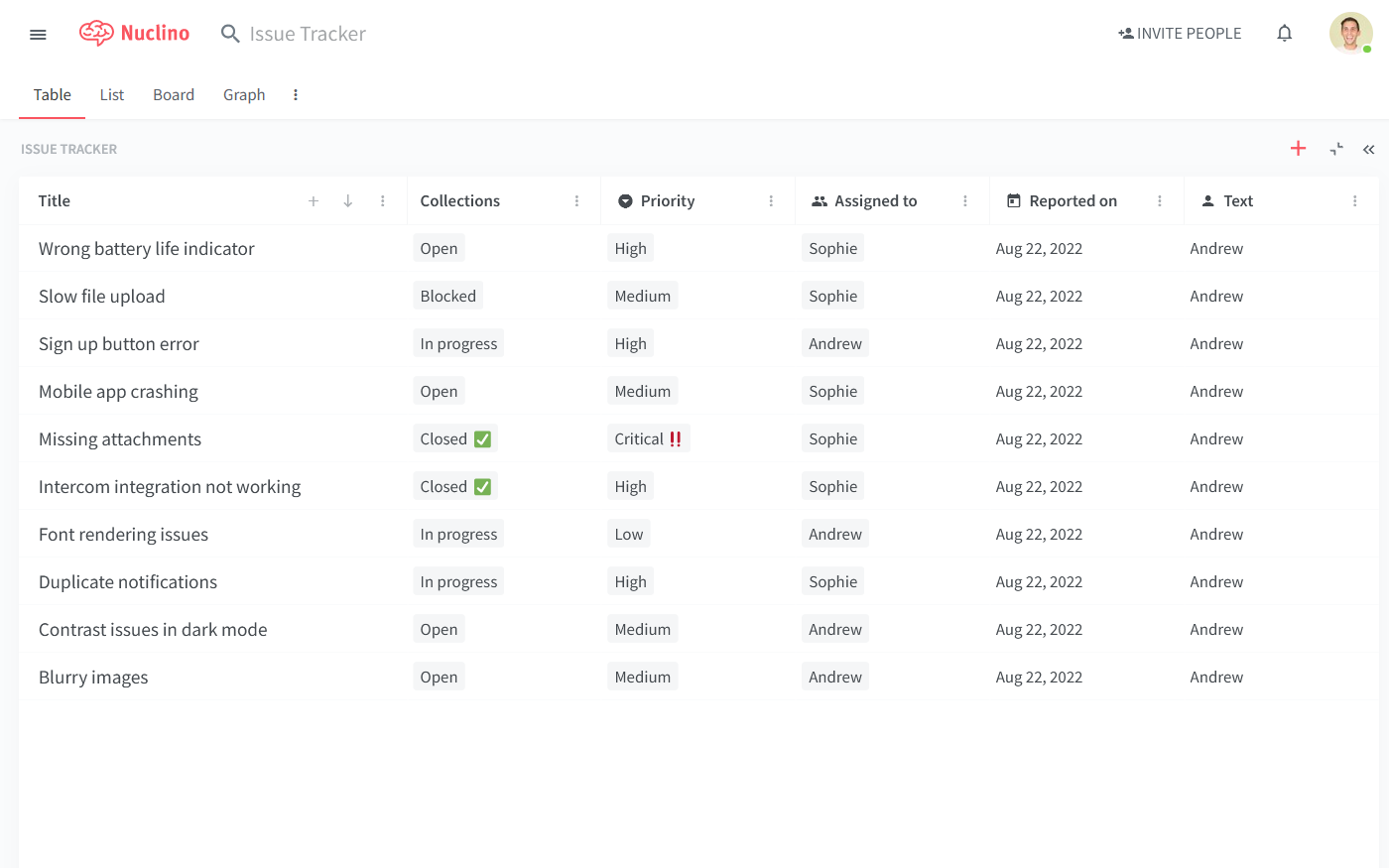
One key advantage of Nuclino is its diverse variety of ways to structure your docs. While BookStack only allows you to organize pages into books and chapters, Nuclino allows you to group items in collections that can be nested infinitely.
In addition to a nested list, you can visualize your work in a Kanban board, a table, and a mindmap-style graph. This makes it a great solution for many additional use cases, including project collaboration, sprint planning, issue tracking, asynchronous communication, and more. It works like a collective brain, allowing you to bring all your team's work together in one place and collaborate without the chaos of files and folders, context switching, or silos.
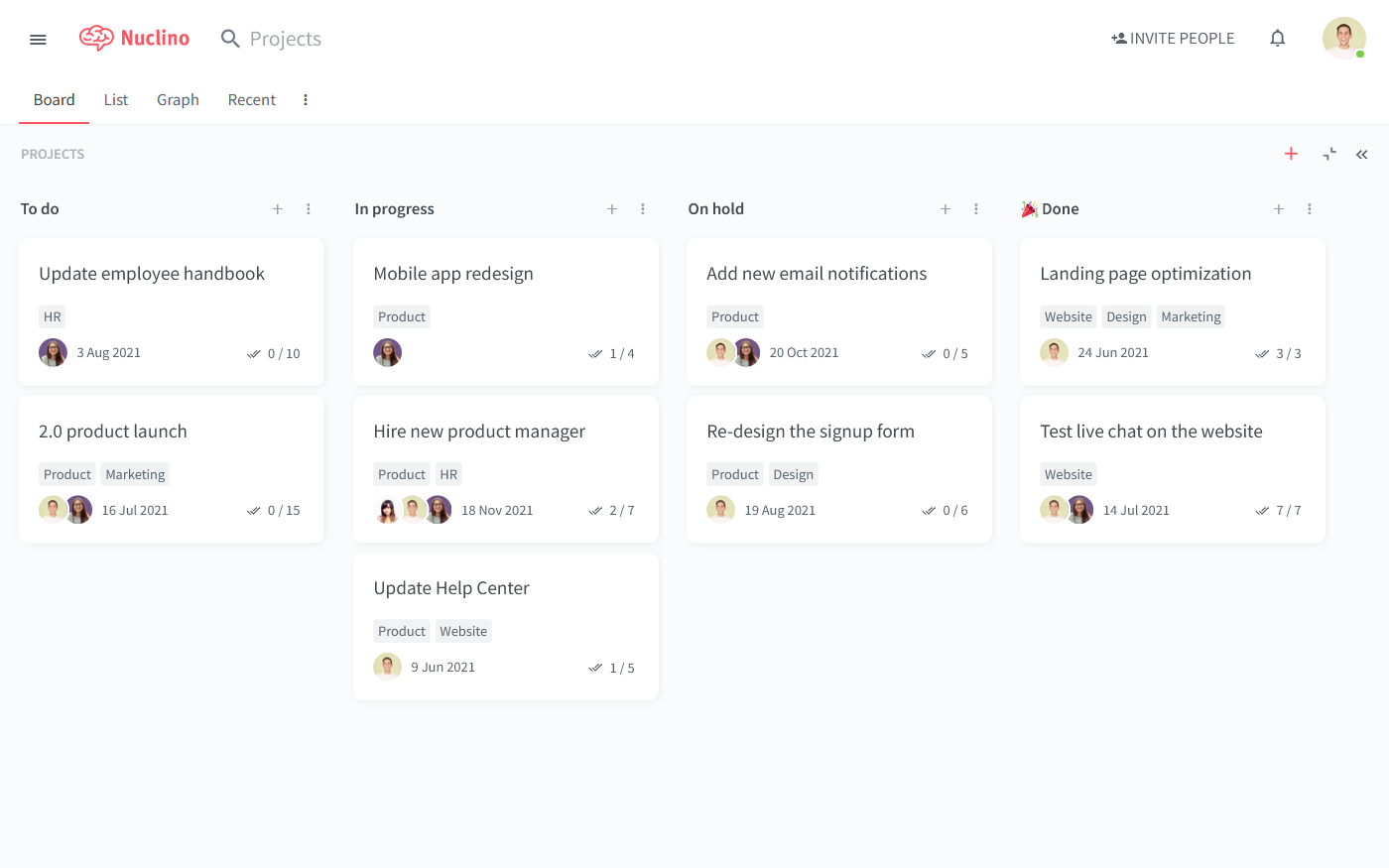
At the same time, Nuclino remains a remarkably lightweight and simple tool. Its interface is clean, intuitive, and distraction-free, with no clunky menus or complex settings. It requires minimal configuration and works out of the box, allowing anyone to quickly get started with the tool.
What users say about Nuclino:
"Great knowledge base for capturing information. We use Nuclino daily to make sure we're documenting everything — from sales playbooks to HR processes to specific data collection checklists. It's easy to use, update, comment, and share."
2. Confluence
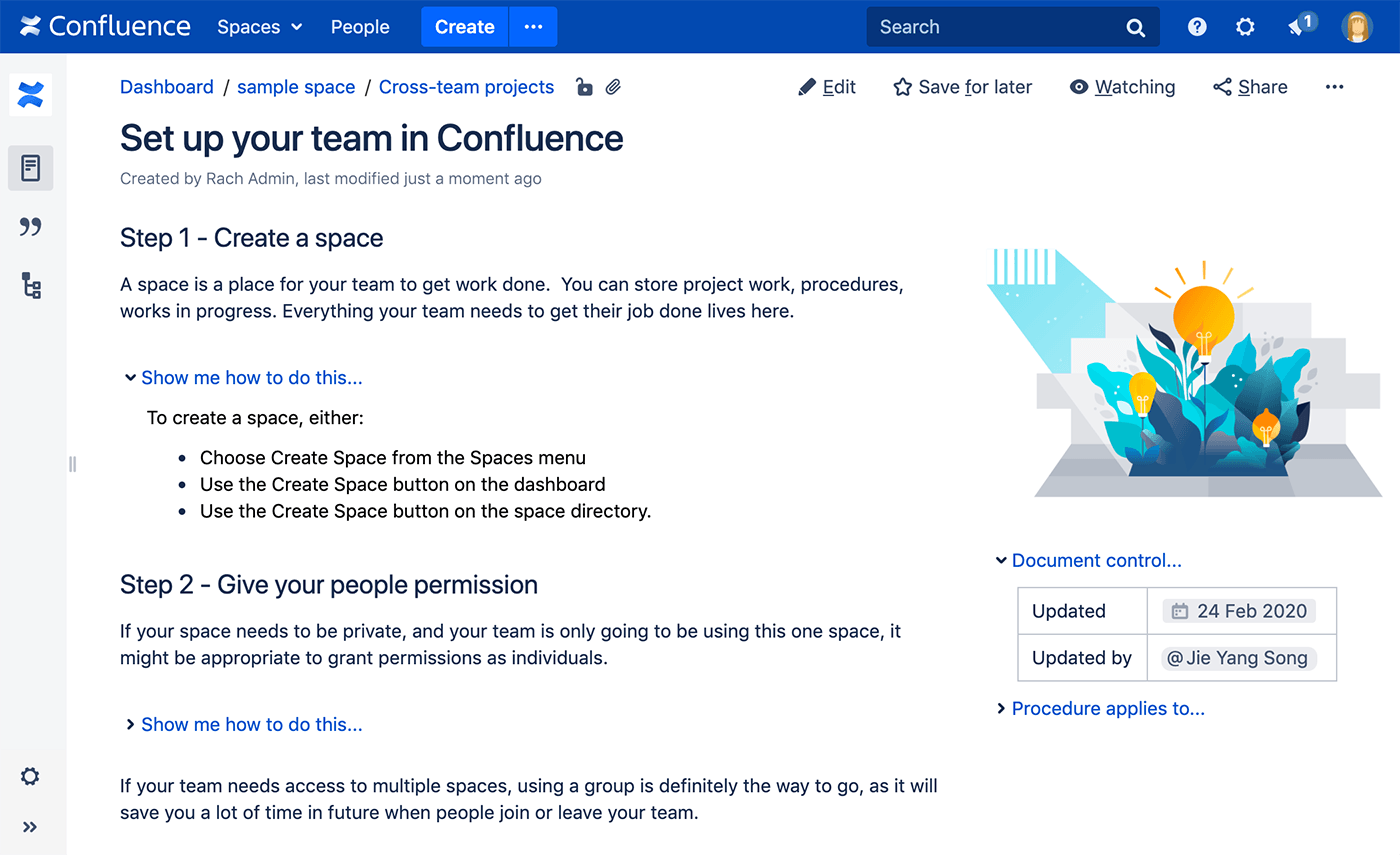
Pricing: Free, advanced features starting from $6.70/user/month (for a team of 10)
Rating on Capterra: 4.5/5
No list of BookStack competitors would be complete without mentioning Atlassian Confluence, one of the oldest knowledge base software and documentation tools available. Both BookStack and Confluence cater to developers, however, compared to BookStack, Confluence is more feature-rich and scalable, making it suitable for larger enterprises with diverse collaboration and documentation needs.
As part of the Atlassian product suite, Confluence's key strength lies in its seamless integration with other Atlassian tools like Jira and BitBucket.
Looking for more tools similar to Confluence? Check out this list of Confluence alternatives.
What users say about Confluence:
"Confluence helped our team document our processes and compile our technical documentation and scripts in a central location. Confluence makes it easy to create and share a document, and also update documentation and alert 'watchers' (those tied to a page) whenever changes are made. The ability to link articles to Jira helps tie technical issues to real problems that were solved. Confluence is very feature-rich and takes some time to learn, but it is worth the investment."
3. GitHub Wiki
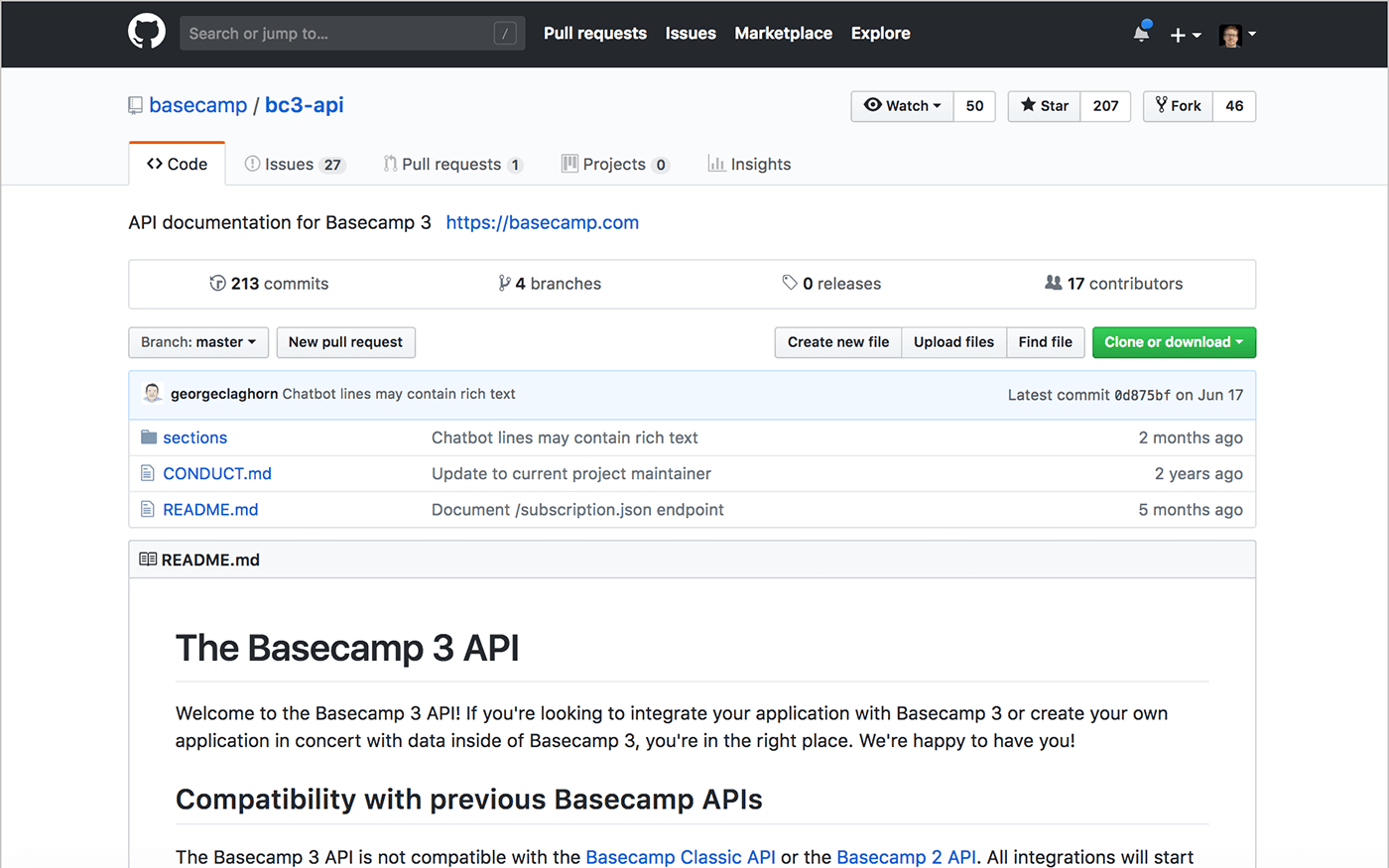
Pricing: Free, advanced features starting from $4/user/month
Rating on Capterra: 4.8/5
GitHub Wiki is another popular alternative to BookStack. GitHub Wiki is a documentation feature provided by GitHub, a widely used web-based platform for version control and collaboration. It serves as a space within a GitHub repository where users can create and edit documentation pages directly associated with the project.
As an alternative to BookStack, GitHub Wiki is appealing due to its seamless integration with GitHub repositories. The wiki is built on the same version control system, allowing users to manage documentation alongside their codebase. This integration simplifies access control, as permissions are linked to repository access.
What users say about GitHub Wiki:
"GitHub checks all the boxes for a basic version controlling platform, but it has so much more available. It has tons of great integrations to run tests against code, as well as plenty of ways to create internal documentation similar to a wiki article."
4. Docusaurus
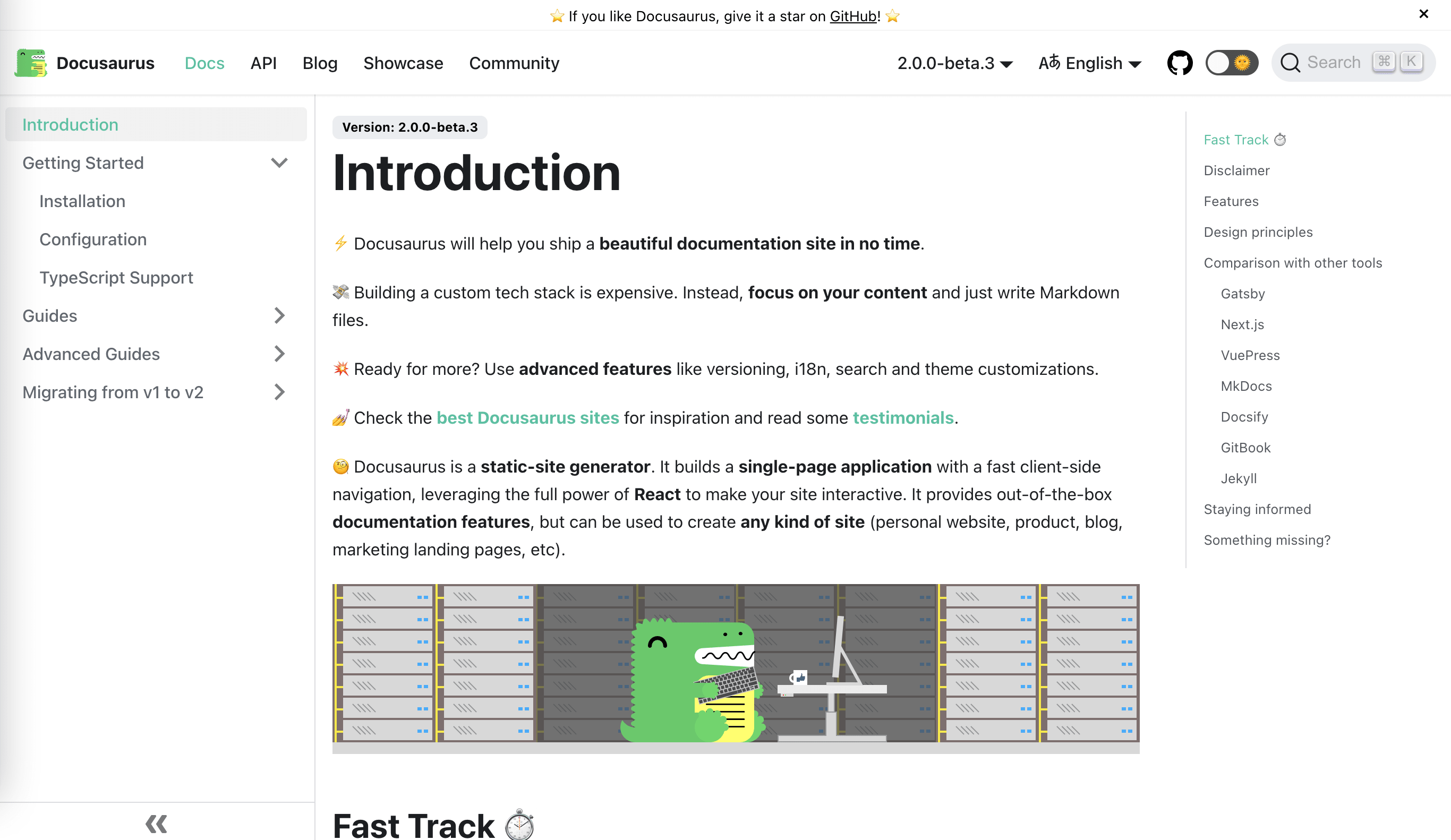
Pricing: Free, open-source
Rating on Capterra: No rating yet
Docusaurus is an open-source free documentation platform primarily used for building and maintaining websites. It is commonly employed by developers and teams to create documentation websites for their projects. Unlike BookStack, which focuses on a more comprehensive documentation management system, Docusaurus specializes in generating static websites for documentation.
Docusaurus is built using React, ensuring a modern and responsive user interface. It allows for easy customization through theming, letting you adapt the look and feel to match your project's branding. The framework also supports localization, making it convenient for projects with a global audience.
What users say about Docusaurus:
"The best way to build documentation today. Easy to use, extensible, strong community support in case of problems. As it's open-source, you can still contribute if you want a new feature or need a bugfix."
5. Wiki.js
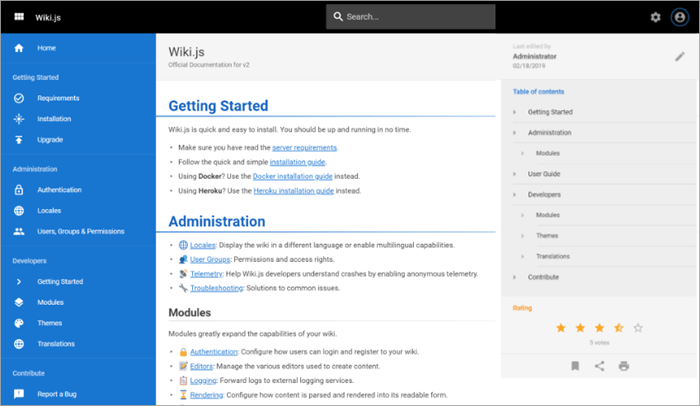
Pricing: Free, open-source
Rating on Capterra: No rating yet
Wiki.js is another open-source platform designed for collaborative documentation, similar to BookStack. Developed in JavaScript, Wiki.js uses the Node.js runtime and supports various database backends, including SQLite, MySQL, and PostgreSQL.
In terms of functionality, Wiki.js shares common features with BookStack, such as support for markdown editing, version history, and user permissions. However, Wiki.js distinguishes itself with a focus on flexibility and extensibility. It provides a plugin system that allows users to enhance and customize the platform according to their specific needs.
6. DokuWiki
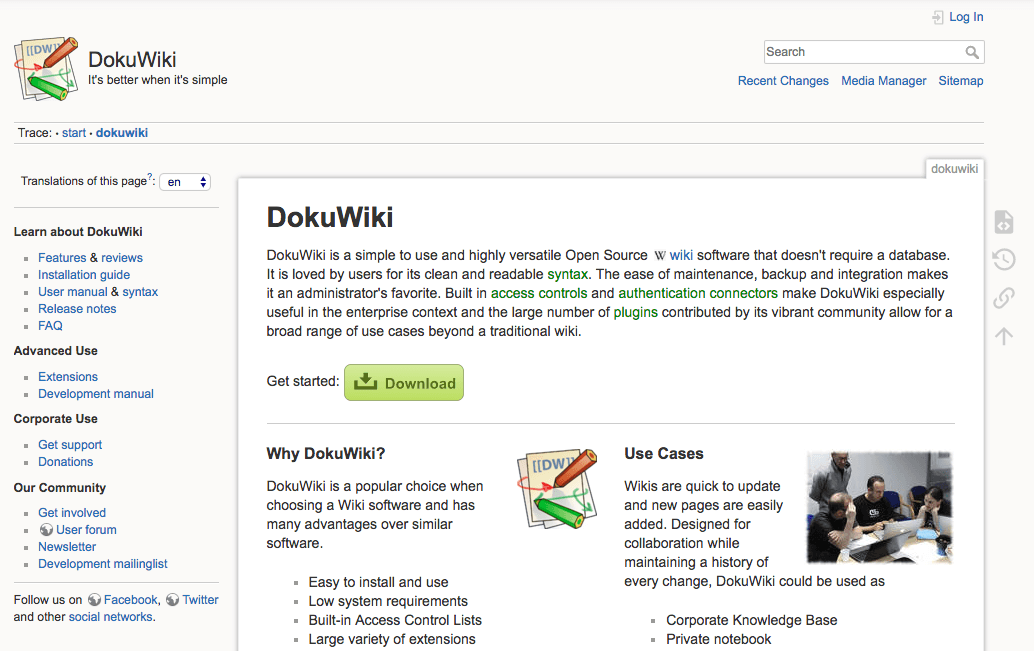
DokuWiki is similar to MediaWiki in many ways. Both are open-source, self-hosted, and free wiki platforms written in PHP.
But while MediaWiki is primarily designed for building large and complicated wiki sites, DokuWiki is best suited for smaller wikis. MediaWiki is more powerful, flexible, and scalable, yet more complicated to set up and manage. DokuWiki, on the other hand, is simpler and relatively easier to install and maintain. Unlike MediaWiki, which requires a database to be installed, DokuWiki stores all data in files.
What users say about DokuWiki:
"As the name implies, DokuWiki is made for documentation, manuals, and descriptions. This is also, where the software can score its most points. It is possible to create nicely formatted and easy-to-read documentation and information. In addition, the installation and menu are quite easy. But while DokuWiki does certainly perform its duties more than well, the design looks a bit dated and simple."
Find the best BookStack alternative for you
BookStack is a solid documentation tool, but it might not perfectly align with your organization's needs. While there's no definitive "best" alternative to BookStack, and each solution brings its own set of features and strengths to the table.
We hope this list helps you narrow down your options and find the right BookStack replacement for you and your team.
Ready to get started?
